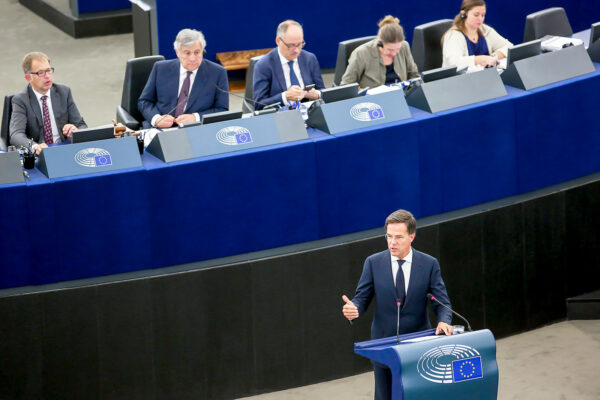
Two years ago, the Netherlands’ center-right prime minister, Mark Rutte, defeated the far right by adopting some of its policies on immigration while rejecting its divisive rhetoric.
In the run-up to this year’s provincial and Senate elections, he is claiming the center ground instead.
Move to the middle
Whereas Rutte once led the fight against green-energy subsidies and was willing to stake his political career on a tax cut that only benefited the Netherlands’ largest multinationals, Shell and Unilever, he has recently agreed to an expensive climate plan that would largely be paid for by corporations.
Political columnist Tom-Jan Meeus suspects the plan, which is backed by the Green party, may be a taste of things to come.
Rutte will likely need the Greens in the new Senate. The four parties in his coalition are projected to lose their majority. The Greens could double their seats.
Voters elect provincial deputies on Wednesday, who elect a new Senate in May.
In an interview on Sunday, Rutte defended his political flexibility, arguing, “This country is built on compromises.”
It’s not just on the environment that he has moved to the middle. He once (unsuccessfully) campaigned against a second Greek bailout and teamed up with David Cameron to make the EU more market-focused. He still argues for an emphasis on the single market as opposed to political union in Europe, but his speeches have become notably more pro-EU. Rutte is even considered a candidate to succeed Donald Tusk as president of the European Council.
Political reality
Rutte claims he has only changed his mind with the facts. Renewable energy has become commercially viable; the world around the EU is becoming more dangerous, making cooperation inside it more urgent.
But his shifts also owe to a changing political reality.
In power since 2010, Rutte has governed with nearly all non-fringe parties left, right and center. In those years, the Dutch political landscape has become even more fragmented than usual. Whereas it used to take two or three parties to form a government, now it takes four or five.
The upside is that big reforms, whether in climate policy, pensions or taxes, are broadly supported across the political spectrum once they are enacted. Rutte has become a master at fostering consensus. Dutch voters perennially complain about their politics, but they give high marks to their personal lives. The economy, although slowing down, is in good shape. More Dutch people are in work than ever before. Rutte deserves at least some of the credit.
Risks
There is a downside. Broad left-right coalitions give credence to the populists, who claim that all mainstream parties are the same.
Thierry Baudet, the leader of the upstart right-wing Forum for Democracy, complains that the Netherlands is ruled by an undemocratic “party cartel”. Geert Wilders of the nationalist Freedom Party claims a vote for Rutte is a vote for the Greens.
Support for the Freedom Party has been stable around 12 percent since the last election. Forum for Democracy is up from 2 to 8-10 percent. Both parties toy with an EU exit. Both resist immigration from Muslim countries. Both sympathize with American president Donald Trump and, in Baudet’s case, with Russian president Vladimir Putin. Both draw voters away from Rutte’s liberals and their traditional rivals on the right, the Christian Democrats.
On the far left, the Socialists take another 8-10 percent of the vote. Like the populists of the right, they are mostly unwilling to do deals with the government.
The result is a vicious circle: as anti-establishment parties grow, so does the need for the remaining parties to compromise and keep the country governable, which only aggravates fringe voters even more.
